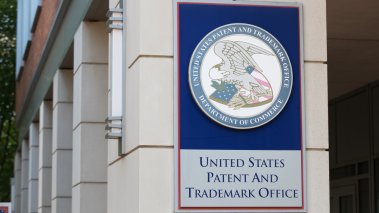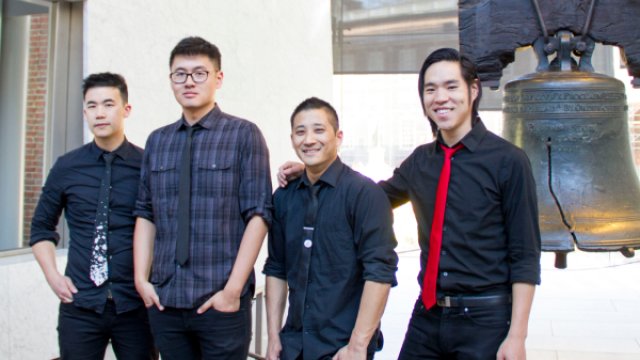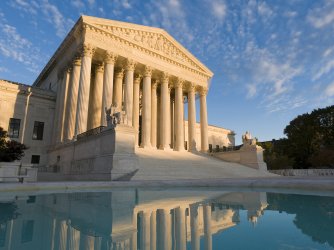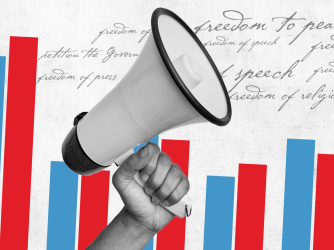Table of Contents
Federal law unconstitutionally lets government officials and public figures veto their critics’ trademarks

Mark Van Scyoc / Shutterstock
The United States Patent and Trademark Office in Alexandria, Virginia.
Would you consent to someone making a bumper sticker for the sole purpose of publicly criticizing your job performance? We didn’t think so.
Yet federal trademark law forces speakers to get permission from people — including politicians — before registering trademarks that include their name. A trademark for “Does Obamacare?” needs permission from the former president. Likewise, the current president’s approval is needed for the trademark “Leave Biden Behind.” These are real examples: The U.S. Patent and Trademark Office rejected applications to register both of these trademarks because the politicians named did not consent.
A newly filed amicus curiae — “friend of the court” — brief by FIRE and joined by the Manhattan Institute urges the Supreme Court of the United States to throw out this veto power once and for all. The First Amendment doesn’t allow politicians to silence their critics’ trademarks while also approving more flattering ones.
In Vidal v. Elster, the Supreme Court will hear an appeal from the U.S. Court of Appeals for the Federal Circuit, which hears appeals from the U.S. Patent and Trademark Office. The Court of Appeals struck down the trademark law, 15 U.S.C.§1052(c), insofar as it required an applicant to get permission from a public figure or government official before using that person’s name in a trademark. It held that the Patent and Trademark Office violated the First Amendment by holding that when a mark contains criticism of a government official or public figure, the trademark law’s permission requirement is an unconstitutional restriction on the content of speech.
There’s simply no good reason to let someone veto a trademark application based solely on the viewpoint it conveys. For that reason, FIRE’s brief urges the Supreme Court to affirm the decision below.
FIRE and the Manhattan Institute suggest the Supreme Court affirm the Federal Circuit’s decision on even simpler grounds: Giving anyone a veto on the views expressed about them is unconstitutional viewpoint discrimination, plain and simple.
The case arose when Elster applied for the trademark “TRUMP TOO SMALL” for use on T-Shirts. The Patent and Trademark Office refused to register the trademark, and Elster appealed.
Numerous trademarks have been issued using the former president’s name: “GOTRUMP,” “SUCCESS BY TRUMP,” and “TRUMP CARD” are just a few examples. Many other trademark applications have been denied: “DUMP TRUMP AND LOCK HIM UP,” “TRUMP CHUMP,” and “TRUMP LIED, THOUSANDS DIED.”
See the difference? Requiring permission from someone to use their name gives that person a veto power over messages that a trademark might convey. Flattering messages get approved, but critical messages, not so much.

Supreme Court strikes down law prohibiting disparaging trademarks, affirms protection for offensive expression
News
In a highly anticipated ruling yesterday, the Supreme Court of the United States held in Matal v. Tam that the First Amendment prohibits the federal government from denying registration to “disparaging” trademarks.
This is classic viewpoint discrimination — which is something the Supreme Court has said, not just once, but twice, that the First Amendment forbids when it comes to trademarks. The government cannot dole out trademark registrations based on whether a public official or figure agrees with the applied-for trademark’s message. Otherwise, the law would ensconce an extreme heckler’s veto, where the very person criticized by the speech gets to decide whether that speech is allowed. And it does so for, of all people, public figures — the very people we are most likely to criticize are also the most likely people to be the subject of trademark applications. The First Amendment firmly protects Americans’ right to comment on or criticize public figures, like politicians.
The trademark law itself, of course, doesn’t distinguish between criticism and flattery. But that alone does not make it viewpoint neutral. By giving a veto to the person named in the trademark, the law all but assures that only flattering marks will be registered. The government cannot condition one person’s protected speech on getting permission from someone else. Doing so creates de facto viewpoint discrimination. The law might say merely, “get permission from so-and-so,” but what it really means is “you may only express views so-and-so agrees with.” That’s unconstitutional.
What about the misuse of trademarks to harm people? Trademark law already has provisions protecting that. It guards against deceptive or misleading marks — like those that falsely suggest a connection with the named person. Rules against misappropriation prohibit making a buck off someone else’s reputation. And defamation law still applies if a mark includes false information about someone.
There’s simply no good reason to let someone veto a trademark application based solely on the viewpoint it conveys. For that reason, FIRE’s brief urges the Supreme Court to affirm the decision below.
FIRE thanks Christopher Michel, Todd Anten, Jessica Rose, and Alex Van Dyke from Quinn Emanuel Urquhart & Sullivan, LLP for authoring the brief on FIRE’s behalf.
Recent Articles
FIRE’s award-winning Newsdesk covers the free speech news you need to stay informed.

MIT stops using DEI statements in faculty hiring

The 8 First Amendment cases the Supreme Court will decide this term



